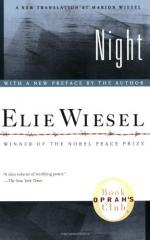|
|
Night Author/Context
Eliezer (Elie) Wiesel was born on September 30, 1928 in Sighet, a border town between Hungary and Romania. Wiesel grew up in the town's shtetl, or Jewish section, where his father, Shlomo, was a shopkeeper and a well-respected leader in the Jewish community. As a young boy, Wiesel was devoted to the study of the Torah, the Talmud, and the mystical writings of the Kabbala. In the spring of 1944, when Elie was only fifteen years old, the Germans deported 15,000 Jews from Sighet to the notorious concentration camp, Auschwitz. His mother and younger sister Zipporah were exterminated at Birkenau, his two older sisters, Hilda and Bea, managed to survive. Until his father's death in Buchenwald, Wiesel and his father were together throughout their internment, the experiences of which he writes about in his autobiographical novel, Night.
After the liberation of Buchenwald, Elie Wiesel and many of the surviving children were sent to France. In Paris, Wiesel decided to learn the French language (the language that he primarily writes in). For several years, Wiesel studied at the Sorbonne, where he was deeply influenced by the existentialist writings of Camus and Sartre. Afterwards, he took various jobs as a journalist, traveling extensively, especially to Israel, North America, South America, and the United States. In 1954, while he was working as a foreign correspondent for an Israeli newspaper, Elie Wiesel met the famous Catholic novelist and moralist, Francois Muriac (author of the foreword to Night). Through Muriac's strong encouragement, Wiesel wrote a memoir of his Holocaust experience.
After honoring his vow of silence for ten years, Elie Wiesel first published a Yiddish version of his Holocaust story in 1956. An English translation of the shortened French version of Night appeared in 1960. It was not the first book to detail the experiences of a Holocaust survivor, but Night has become one of the most widely read, if not the most read book on the Holocaust. Critic Robert McAfee Brown gives Night the distinction of being "the most influential book" in confronting the difficult, harsh memories of the Holocaust. Since the publication of Night, Wiesel has written extensively, utilizing many different literary styles. His novels include Dawn (1960), The Accident (1961), and A Beggar in Jerusalem (1968). He has also written numerous articles, novellas, plays, and a series of memoirs.
In 1969, Elie Wiesel married Marion Erster Rose, who was also a survivor of the concentration camps. She remains his closest collaborator, having translated many of his books. A prolific writer who has won many awards, including the Prix Medicis, one of France's most distinguished literary prizes, Elie Wiesel is also well known as a teacher, lecturer, and spokesman. In 1979, Wiesel was appointed Chairman of the President's Commission on the Holocaust. His story and influence greatly contributed to the heightened awareness of the significance of the Holocaust and the memory of its victims. As a world-renowned champion of peace and human rights, Wiesel won the Nobel Peace Prize in 1986. He is currently serving as the Andrew Mellon Professor of Humanities and University Professor at Boston University.
Bibliography
Estess, Ted. Elie Wiesel. New York: Frederick Ungar Publishing Co., 1980.
Stern, Ellen. Elie Wiesel: Witness for Life. New York: Ktav Publishing House, Inc., 1982.
Wiesel, Elie. Night. New York: Bantam Books, 1982.




